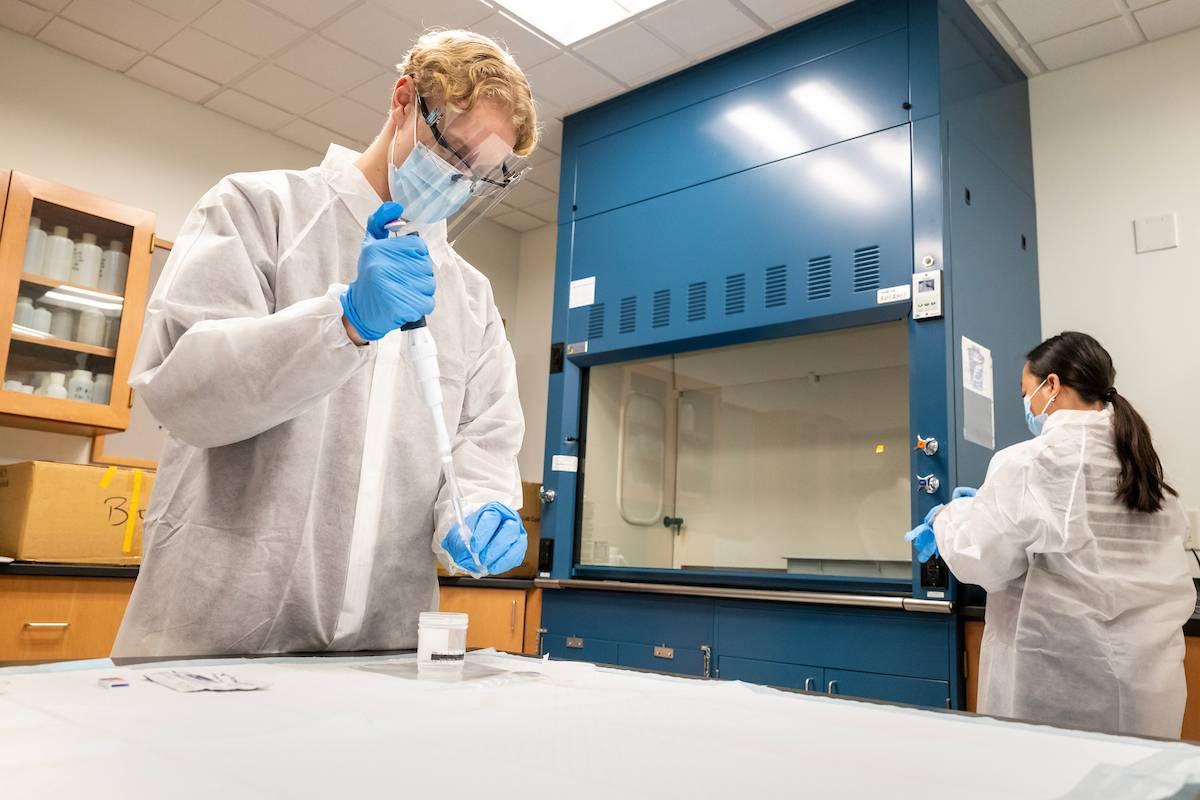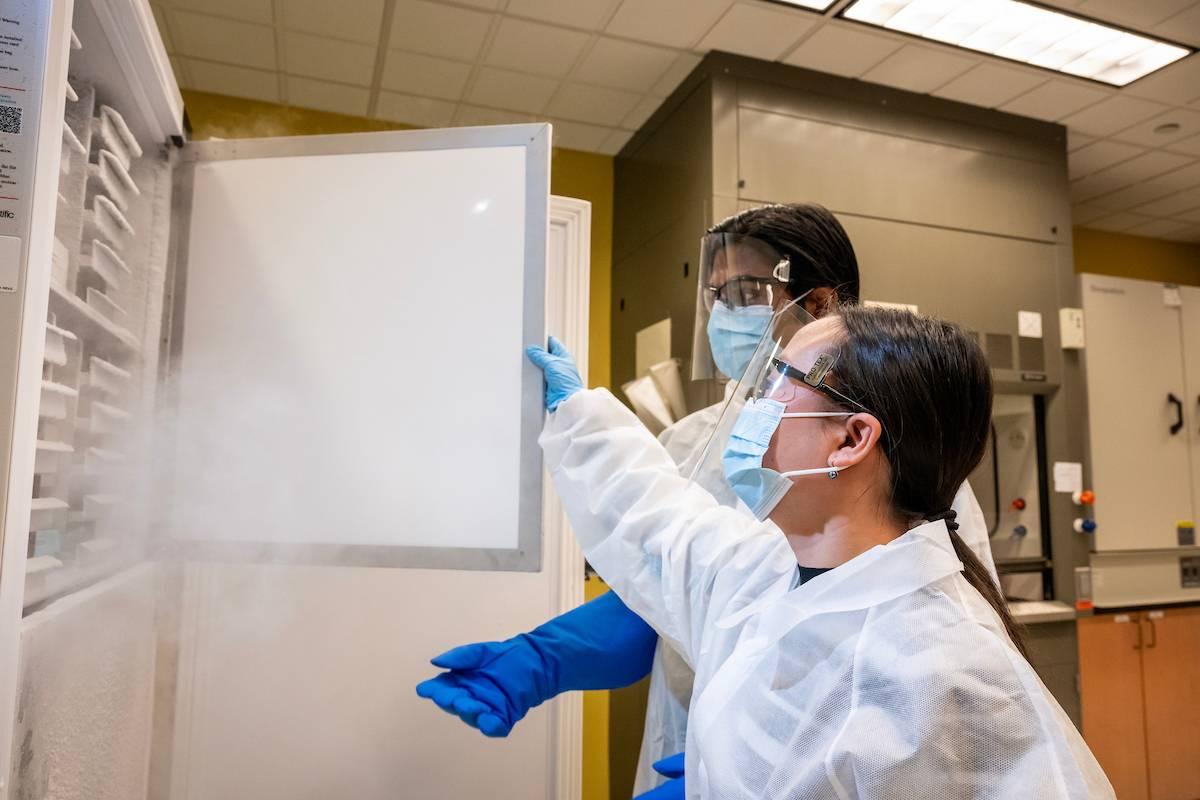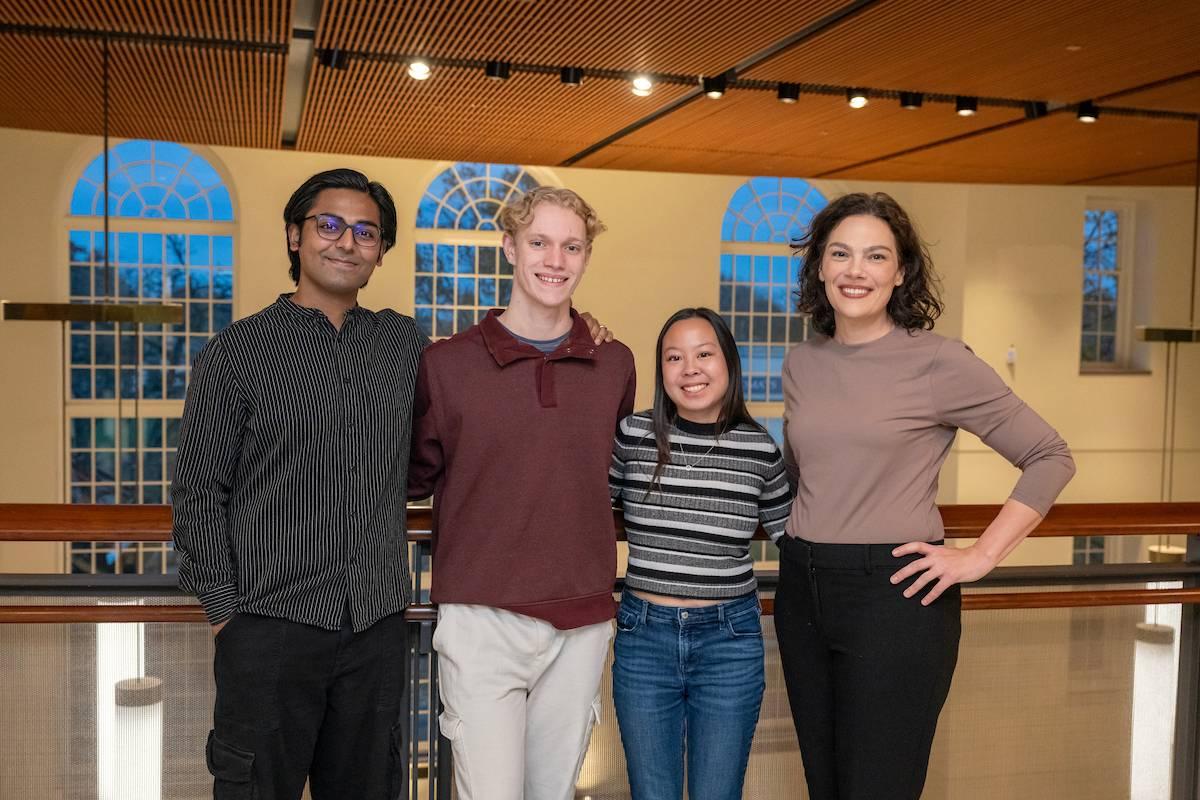F&M Stories
Trailblazing Research Examines Cigarette Label Alternatives
Three Franklin & Marshall students helped conduct a groundbreaking pilot study in Lancaster this summer.
Ibrahim Bin Amjad ’27, Josh Anderson ’27 and Jocelyn Chow ’26 assessed the efficacy of adding safer tobacco alternatives to cigarette warnings under the tutelage of Hollie Tripp, assistant professor of government & public health.
Tripp’s work centers around understanding how people make choices in an effort to improve health policies. Presently, her research focuses on tobacco regulatory science.
The team recruited participants from the Lancaster community to assess the effects of cigarette warnings on smoking behavior, collecting biospecimens and qualitative data.
Josh Anderson ’27 and Jocelyn Chow ’26 test biospecimen samples in F&M's Biosafety
Level 2 (BSL-2) laboratory. (Photo by Deb Grove)
The United States became the world’s first nation to require a health warning on cigarette packages in 1966. These health warning labels are widely regarded as effective tobacco control interventions.
Since that time, modified risk tobacco products (MRTP) have come to market. These products, such as Zyn nicotine pouches, pose lower risks to individuals and populations than traditional cigarettes and have been approved by the FDA.
“While such products carry reduced risk messages on their respective packaging, those who smoke may be unaware that products safer than combustible cigarettes exist,” Tripp said.
Tripp wondered if including MRTP alternatives on cigarette warning labels could lead to less harmful decisions among those who are not ready to quit using tobacco.
“How do we communicate products with less harm than cigarettes?” Tripp asked.
Tripp and the students recruited and conducted a mixed-methods study of adult smokers over age 21. Participants were eligible if they smoked five or more cigarettes daily as their primary form of tobacco use, were not pregnant or trying to quit smoking.
Using random assignment and daily text messages, the researchers showed smokers cigarette warning labels either with or without a MRTP alternative.
Participants gave a urine sample before using a MRTP and a sample after to examine metabolites for nicotine. They were also interviewed about their thoughts of and trust in tobacco warnings.
Ibrahim Bin Amjad ’27 and Jocelyn Chow ’26 work in F&M's Biosafety Level 2 (BSL-2)
laboratory, used to study moderate-risk infectious agents or toxins. (Photo by Deb
Grove) 
Samples were analyzed in a Biosafety Level 2 (BSL-2) laboratory on campus. Amjad, Anderson and Chow received extensive training to handle biological materials.
It's the first instance of F&M research involving the collection of human biospecimens from a non-campus community.
“The fact that this was the first human subjects research study of its kind is pretty amazing. That means public health students – and even our pre-med students – can get these valuable experiences as undergraduates,” Tripp said.
“That's pretty rare at a small liberal arts college,” she added.
Ultimately, Tripp and students are hoping to shift smokers away from harm with their research.
“People know that smoking is bad for them, but abstinence-only messaging may miss a trick,” Tripp said.
The work is a continuation of summer 2024 research done by Tripp, Chow and Faris Grbic ’26 through Hackman Scholar funding. This summer’s continuing research was supported by both Hackman and faculty start-up funds to enable three paid student research positions.
Chow, Grbic and Tripp authored a research paper published by the Journal of Health Communications in May. Chow and Tripp also presented at the Society For Research on Nicotine and Tobacco annual meeting in New Orleans last spring.
“I especially enjoyed interviewing participants and hearing their thought processes behind certain tobacco products and warning images,” Chow said of the research continuation. “It was also really interesting to see how varied their reactions were and how warning labels impacted their health decisions in different ways. That was really rewarding.”
Below, learn more about the students involved in this research.
Ibrahim Bin Amjad '27, Josh Anderson '27, Jocelyn Chow '26 and Hollie Tripp, assistant
professor of government & public health. (Photo by Deb Grove)
Ibrahim Bin Amjad ’27
- Hometown: Lahore, Pakistan
- Joint major: Government, public policy
- Minor: Philosophy
What was the most surprising thing about this research?
“I’m learning things out of my comfort zone. This required a lot of BSL [Biosafety Level] lab training, handling human samples and quantitative work. I donned my lab coat in the morning from 8 a.m. to noon., and then as soon as I got home, I was doing qualitative interviews until 5 p.m. It was like two different worlds.”
Josh Anderson ’27
- Hometown: Milford, Mass.
- Major: Public health (biology)
- Minor: French
What inspired you to take on this research?
“I loved [Tripp’s] drug policy class. I was already interested in how drugs and government intersect. I was really excited to work in an environment that was different to me in a research setting. I knew going into college that I wanted to do research. My goal is to go into the nonprofit global health sector.”
Jocelyn Chow ’26
- Hometown: Emmaus, Pa.
- Major: Public health (biology)
What did you enjoy most about this research?
“It has definitely given me a bigger interest in health communication as it relates to public health. And as a pre-med student, I'm really interested in seeing the different aspects of how public health relates to medicine and how medicine is inherently human. There are a lot of different things that go into it other than just pure science.”
Related Articles
February 16, 2026
Powering Innovation: Inside F&M’s Campus Supercomputer
Imagine 1,600 computer processors combining power toward one task. This is the engine driving innovation at F&M. Called a High-Performance Computing (HPC) cluster, this elite shared resource accelerates discovery, empowers large-scale research, and fuels the collaborative spirit that defines the F&M experience.
February 3, 2026
Coral, Caves and Ice Cores: The Path to Hydrology for Monica Arienzo ’08
Hydrology research has taken Monica Arienzo ’08 to coral reefs in the U.S. Virgin Islands, underwater caves in the Bahamas and ice cores in Antarctica and Greenland.
January 28, 2026
Virtual Cadaver Lab to Redefine & Accelerate Health Professions Training at F&M
Franklin & Marshall College is set to transform its pre-health and science curriculum thanks to a generous grant from the George I. Alden Trust. The funding will support the development of a state-of-the-art virtual cadaver lab, bringing high-tech, immersive anatomical study to F&M’s campus.
